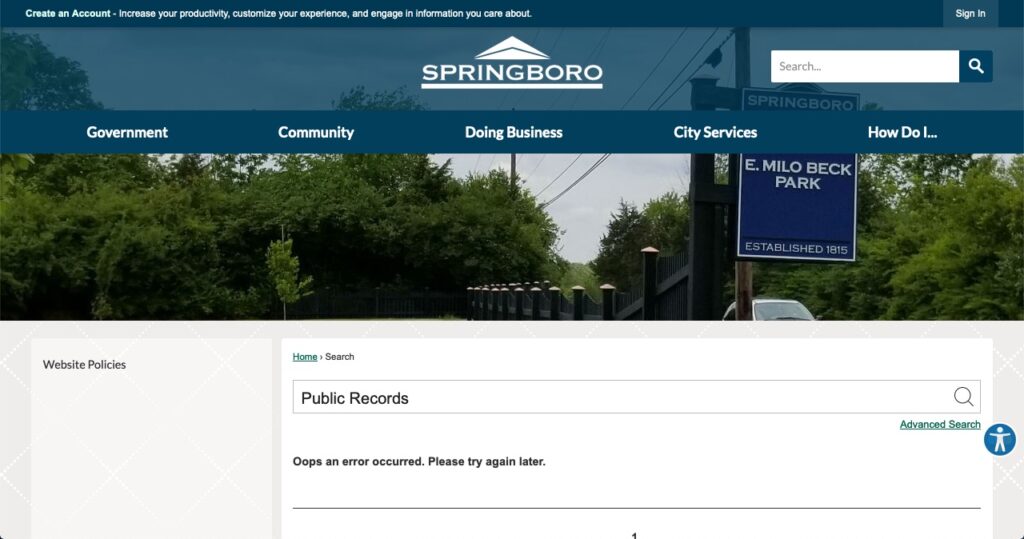
The internet has been around for 30 years. Nevertheless, your public records may be stored in one of these antique devices.
Have you ever wondered how much your local government collects in taxes? Perhaps not, but if you were to wonder such a thing, how easy do you think it would be to obtain this information? According to Ohio law, records must be organized and maintained “in a manner that they can be made available for inspection or copying” and the response to requests must be “prompt.” If you live in Oakwood and you need to obtain information, you’re in luck. Our request was fulfilled within an hour. If you live in Verona, you better make your request on a Monday, Tuesday, or Thursday between 9am and 3pm, the only times their village office is open. But what if you needed to compile data from all of Montgomery County? Could you just ask the county for the desired records? No. Ohio’s sunshine laws allow for records to be fragmented among various local governments, all of which have varying degrees of resources, their own administrators, and their own methods for organizing records.
Over the past couple days we have spent much of our time filing public records requests. Our goal is to collect tax information from the municipalities and townships in Montgomery County to uncover inefficiencies and disparities among our various local government structures. The process of obtaining these records has demonstrated the very inefficiencies we at Reconstructing Dayton are striving to eliminate. It has been an adventure reminiscent of a film montage about determined journalists cracking open a big story. Unfortunately, they use montages for those scenes because actually documenting the reality of pestering bureaucrats for information would make for an incredibly boring film. I’ll stick to the highlights.
We asked for straightforward information—the types of things that should be merely a few clicks away for a local government bureaucrat. The types of things that could easily be made available to the public through government websites, like how many people live in a locality and how much they are taxed. Would you be concerned if your local fiscal officer or city council administrator could not quickly and easily find this information? If so, be concerned.
The fragmentation of our local governments makes it very difficult to collect information. First, you have to identify all the cities, villages, and townships in the county. This becomes complicated because parts of Dayton, Kettering, and Centerville cross into Greene county, while part of Huber Heights crosses into Miami County. Complicating things further, the majority of Verona is located in Preble County and the majority of Carlisle and Springboro are in Warren County. To get all this information you can go to the Montgomery County website for a list of municipal and township websites. What’s that? You’re from Phillipsburg and you don’t see yourself on that list. Sorry, it appears that, according to Montgomery County, you don’t really count.
When you get to these websites you may notice something odd. While many have the appropriate domains of .gov or .oh.us, many have employed the technologically illiterate to set up their websites under .net, .org, or .com domains. This seems to imply that Huber Heights is a nonprofit organization and Brookville is a commercial enterprise. Farmersville made a noble attempt to appear official with a .us domain name, but unlike the restricted .oh.us, anyone can register a .us domain name. All of this would be quite funny if not for the fact that restricted domains exist so that citizens can trust the website. For example, currently anyone can register the domain name www.phillipsburg.us and set up a bogus utility payment app to scam citizens out of money. The integrity of restricted domains doesn’t work when local governments fail to take advantage of them. Even Montgomery County itself uses www.mcohio.org. Of course, all of these localities do better than Verona, which has yet to discover the internet.

Searching for “Public Records” on Springboro’s website produces an error. Go figure.
Next comes the challenge of figuring out who to contact and how to contact them. Dayton and Huber Heights both have easy forms that can be filled out. For other local governments you have to acquire the contact information for the person most likely to be able to fulfill your request. For our purposes, these people hold a variety of titles: finance directory, fiscal officer, administrator, and city manager, among others. Most sites provide an e-mail, though some require you to fill out a form to contact anyone. A few localities do not provide any way to digitally contact administrators, but we were able to file these requests with a simple phone call. We found this preferable to contacting a Hotmail account listed for German Township’s fiscal officer and an AOL account listed for Phillipsburg’s fiscal officer. Did Hillary Clinton teach us nothing about using private e-mail for government work?
After you e-mail the appropriate person or fill out the appropriate form, the next thing to do is wait. It’s been three days and we’re still waiting on ten localities to respond to our initial e-mail despite the fact that they are required by law to promptly respond to let me know that the request has been received. The council clerk from Centerville has opened our e-mail over twenty five times (we have a tracker) but she has yet to respond. Some who respond are less than useful. German Township’s fiscal officer didn’t know if the records we requested existed. He suggested we contact the county (he was correct). After we filled out the Riverside web form, we got a response telling us that they could not access the information because they rely on a third-party to collect their income taxes. After we quoted the necessary passages from the Ohio Sunshine Laws manual informing them that third parties creating records while performing a government function are subject to public records requests, they complied. Jefferson Township appears to be equally ignorant of state law as they insist that requesters fill out a form that requires one to identify themselves. Both the form and identity requirement violate state law (having a form isn’t a violation, but insisting upon its use to fulfill a records request is).
Why is this information so difficult to obtain? Because our division of jurisdictions was designed for a state of 60,000 people long before highways or computers. It was designed for a world where it took a day to go from Dayton to Miamisburg and another day to get back. Now we have computers that make the compilation, storage, and distribution of public records nearly instantaneous, but we do not realize this potential because we still structure things like it’s 1803. Worst of all, we’re paying a premium for this system because all these individual administrators, websites, and record keeping systems cost money. We pay more to get less. While this does not violate the letter of the law when it comes to public records, it certainly violates the spirit because individuals do not really have “prompt” access to public information by modern standards. They must traverse a maze of bureaucracy.
In the coming weeks we will compile the data to show you who gets what share of the tax pie in Montgomery County. We are seeking these records to identify the inefficiencies of our local system of government, but the process ironically demonstrated the problems regional fragmentation as convincingly as any numbers could.


Trackbacks/Pingbacks